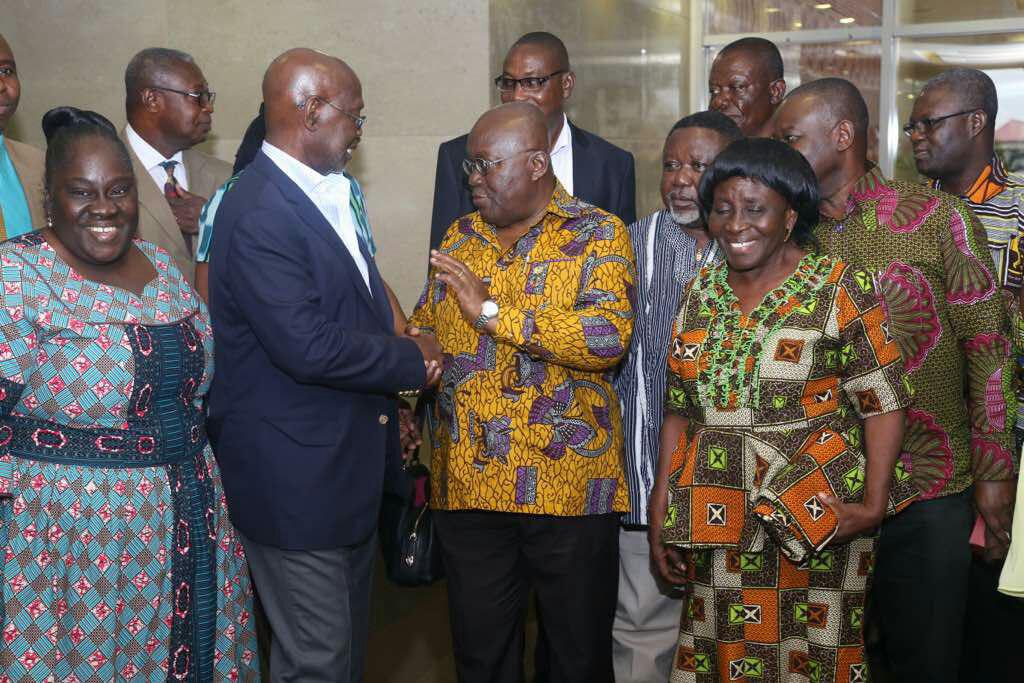
NDPC members resign en masse
Members of the National Development Planning Commission (NDPC) on Tuesday tendered in their collective resignation to President Nana Addo Dankwa Akufo-Addo at the Flagstaff House.
The Professor Kwesi Botchwey-led NDPC also presented a document titled: “Black Star Rising (Long-term National Development Plan of Ghana, 2018–2057)” to the President.
Announcing their decision during a meeting with the President at the Flagstaff House, Prof. Botchwey said the move was to allow the President the space to give a new direction to the commission.
Response
While welcoming the decision of the commissioners to resign, President Akufo-Addo stated that their collective resignation brought to mind the principle of “new king, new law”.
He expressed his sincere appreciation for the collective decision made, without the compulsion of law, to submit their collective resignation to allow the principle of ‘new king, new law’ to operate, saying: “It is a mark of high patriotism and I am grateful for it.”
The President expressed appreciation to the chairperson for the policy direction provided and to the Director-General, Dr Nii Moi Thompson, for the organisational and technical leadership that got the document out.
“From the little I know of the operations of the commission, I am aware that each and every one of you has made a significant input into this document. Your experience and knowledge have no doubt been brought to bear in the drafting of the document. I wish, again, to thank you all for the contribution you have made,” he said.
Coordinated programme
President Akufo-Addo announced that the government’s co-ordinated programme of economic and social development policies are ready for submission to Parliament at its next session.
He said although Article 36 (5) of the 1992 Constitution required that the President submitted to Parliament within the first two years of his administration such a programme, the government’s co-ordinated programme of economic and social development policies was ready.
“This time, we have worked to ensure it is completed within the first year of my tenure of office. The Cabinet has approved it for submission to Parliament and that will happen in the next session of Parliament that begins next week,” he said.
![]()
Rapid progress
He noted that the programme which had been submitted to him “presents my government and subsequent governments with a daunting task, not so much the implementation but to stay on track and ensure we have the desired outcome. We must be able to monitor our progress and redirect our paths when we seem to be deviating from them”.
Compared with countries that attained independence at the same time as Ghana, he said, it was evident that Ghana should be farther along in its national life than it was presently.
“We must, therefore, make rapid progress and do things to ensure that we achieve that,” he stated.
President Akufo-Addo said he was hopeful that the implementation of the programme would result in the creation of “a strong, buoyant economy that will provide decent jobs for all; and that our school leavers from secondary and university will not spend an inordinate amount of time, as they do now, to get jobs or create some for themselves and for others”.
Under the programme, he said, he was hopeful that being a Ghanaian “will be associated with tangible benefits, such as free basic education, a good healthcare system, the rule of law and security in the country; and that, reciprocally, the citizens will exude levels of discipline and professionalism that engender efficiency in the management of our institutions and the development of our society”.
The President noted that the details of the government’s programme met substantially those of the National Development Plan submitted to him by the NDPC, adding that “we all agree that we must build a Ghana beyond aid”.
“We must not and cannot fail in taking up this journey. We need to seek out those who are not yet convinced and bring them on board; and we need to have people to champion the different aspects of the plan, in particular the key milestones. We must figure out how we sustain the interest of key constituents, especially the youth, who will be at the helm of affairs in the not-too-distant future,” he said.
